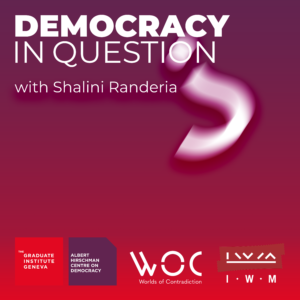
„Der größte Teil der Weltbevölkerung lebt heute in einer formalen Demokratie. Doch sowohl in etablierten als auch in neuen Demokratien sinkt das Vertrauen in Parlamente und politische Parteien. Soziale Ungleichheiten, politische Polarisierung und eine Politik des Hasses befeuern die Situation noch weiter“, betont Professorin Shalini Randeria, die Rektorin des Instituts für die Wissenschaften vom Menschen (IWM) in Wien und Professorin für Sozialanthropologie und Soziologie am Graduate Institute for International and Development Studies in Genf ist, wo sie auch das Albert Hirschman Centre on Democracy leitet.
Als Wissenschaftlerin habe sie sich über viele Jahre hindurch mit der Frage beschäftigt, wie das Funktionieren des Rechts unser tägliches Leben in einer globalisierten Welt prägt. „Mich interessiert, wie Bürgerinnen und Bürger sowohl die Straße als auch die Gerichte nutzen, um zu protestieren und Machtmissbrauch aufzuzeigen, aber auch, um die Demokratie über die Durchführung von Wahlen hinaus zu schützen und zu verteidigen.“
Forschungen zu „Weichen Autoritarismen“
Auch als Excellence Chair an der Universität Bremen beschäftigt sich Shalini Randeria mit diesen Fragestellungen. Hier hat sie innerhalb der Verbundforschungsplattform „Worlds of Contradiction“ die Forschungsgruppe „Soft Authoritarianisms“ ins Leben gerufen, in der ein interdisziplinäres Team neuartige Verflechtungen zwischen demokratischen und autoritären Regierungsformen untersucht. Anhand von Fallstudien zu Frankreich, der Türkei und Polen werden Prozesse der Normalisierung autoritärer Rhetoriken und Praktiken, der sukzessiven Aushöhlung demokratischer Institutionen mittels parlamentarischer Mehrheiten oder der wachsenden Infragestellung von Rechtsstaatlichkeit vergleichend analysiert.
In den zehn Folgen des englischsprachigen Podcasts reflektiert Shalini Randeria mit ihren Gästen demokratische Erfahrungen und Experimente auf der ganzen Welt und geht der Frage nach, ob die Krise der Demokratie eine historisch einmalige Herausforderung darstellt oder ob es Parallelen zu politischen Krisen der Vergangenheit gibt. Es wird aber auch darum gehen, ob sich Tendenzen erkennen lassen, die auf eine Erneuerung und Reform der Demokratie hindeuten.
Weitere Informationen zum WoC-Projekt „U Bremen Excellence Chair“ finden Sie hier
Season 4: Episode 3
Imminent Scenarios in Ukraine
Season 4: Episode 2
Geopolitics of the War in Ukraine
Season 4: Episode 1
Freedom of Expression in an Unequal World
Season 3
Season 3: Episode 10
The Genealogy of Illiberalism
Season 3: Episode 9
Governance in Illiberal Democracies
Season 3: Episode 8
Holding Power Accountable with Investigative Journalism
Season 3: Episode 7
Populism and democracy’s ‘critical infrastructure
Season 3: Episode 6
The Right to Belong
Season 3: Episode 5
The Role of Radio in Transitions to Democracy
Season 3: Episode 4
Biopolitics from Below
Season 3: Episode 3
Challenges of the Israeli democracy today
And what are the long-term effects of this radicalization, not just for the Israeli democracy itself, but also for the rights of Arab and Palestinian people in the region? Can democracy survive in Israel when the Arab minority is denied its legitimate claims to equal citizenship in the country? And what is the relationship of religious sentiments, religious resurgence, with democratic politics?
Season 3: Episode 2
Language and public discourse in the success of right-wing political movements
Season 3: Episode 1
The struggle for voting rights in the US today
Season 2
Season 2: Episode 10
Can the concept of „fascism“ be used to understand the pathologies of US politics, past and present?
Season 2: Episode 9
Why are reproductive rights so contentious in the US and Argentina?
Disclaimer: this episode contains explicit language
Season 2: Episode 8
When and how is power visible in politics?
Season 2: Episode 7
How can we structure digital spaces more democratically?
Season 2: Episode 6
Can democracy survive in Hong Kong?
The pro-democracy movement in Hong Kong is facing its most severe crisis today. The Chinese government has been tightening its grip over the island to stifle political protest, impose restrictions on freedom of press, and hamper free and fair elections. Activists have been fighting for civil liberties and democratic rights, from the Umbrella Revolution of 2014 to the huge anti-extradition law demonstrations in 2020. Jean-Pierre Cabestan (Hong Kong Baptist University) explores the events leading up to the backlash against civic activism, the current state of democracy in Hong Kong and its future prospects.
Since the recording of this episode, the Apple Daily has been forced to close. It was the last print news outlet openly critical of the Chinese government.
Season 2: Episode 5
What keeps democracies alive?
Season 2: Episode 4
What is the legacy of Egypt’s Arab Spring, 10 years on?
Season 2: Episode 3
What ails Indian democracy today?
Season 2: Episode 2
Does liberalism need reinvention in the 21st century?
SEASON 2: EPISODE 1
Covid-19: How can we democratize vaccine access?
Season 1
SEASON 1: Episode 10
Democracy from below: What real utopias can we build on?
SEASON 1: episode 9
Can liberal democracy outlive climate change?
SEASON 1: Episode 8
How do economic inequalities corrode democratic processes?
SEASON 1: Episode 7
How does austerity politics weaken democracy?
SEASON 1: Episode 6
What will remain of Trumpism going forward?
SEASON 1: Episode 5
‘Soft Authoritarianism’, a New Face of Electoral Democracy?
SEASON 1: Episode 4
Can Liberal Democracies Right the Wrongs of Racial and Gender Injustices?
SEASON 1: Episode 3
Undermining Democracy by Democratic Means: how can we stop it?
SEASON 1: Episode 2
How Viable is Western Liberal Democracy when Transplanted Across the World?
SEASON 1: Episode 1
A Trumpian Blip or a Fundamental Flaw in American Democracy?
